
Posted on 08/14/2015 1:56:53 PM PDT by Isara
Americans for Prosperity is hosting a discussion with special guest, Senator Ted Cruz.
Cruz will discuss AFP's Reform America 2015 agenda, which is critical for putting our country back on track.
Oh I missed this this time around! Will catch up on the thread....
Shucks...that’s PT no Est time....so I haven’t missed it!
Where can we watch it ..??
We are using an iPad to bring it up on YouTube and our Chromecast widget to push it out to our big HDTV. A little work but very nice.
Nice.
We can rate it.
Thank you - that was wonderful ..!!
Not a barn burner but detailed and substantive.
I love Cruz. He will be the new Attorney General!!
That will be a big waste!
The questions and comments by Cruz failed to address some major issues. We need entitlement reform that Cruz seems to believe we can save SS, Medicare, etc. thru growth. With 71% of the federal budget on automatic pilot, i.e., SS, Medicare, Medicaid, Obamacare, food stamps, debt servicing costs, etc, and the fact that the costs of the entitlement programs will more than double over the next 20 years with the retirement of the baby boomers.
We are an aging society. Our debt is being driven by the entitlement programs. You cannot grow your way out of the problem. Nor can you cut so-called discretionary federal expenditures to any real extent to be meaningful. We must reform entitlements period. The reforms are going to be hard and painful. They are also politically unpopular, which is why it is not being done.
Immigration, legal and illegal: No discussion of legal immigration. We bring in 1.1 million legal permanent immigrants a year and 640,000 legal guest workers annually. Is it any wonder that our labor participation rates are at a 38 year low and that fewer native born Americans are working now than in 2000 despite the fact that two-thirds of the increase of the working age population is due to the native born. Immigrants are taking American jobs and depressing wages.
No discussion of how Cruz would deal with illegal aliens and secure the border, including visa overstays. AFP does not want anything discussed on immigration that is negative. And Cruz stayed away from mentioning it also, no doubt understanding his audience.
From my personal experience with AFP, they want to keep the flow of cheap, exploitable foreign labor going. They are hurting the American worker and destroying the American Dream. AFP is a big contributor to these politicians, including Cruz who supports a major increase in our guest worker programs.
Summary: A disappointing interview with Cruz dancing to the tune paid for by the corporate elites.
Watch the video. Ted Cruz talked about his father coming here with a student visa. After graduating, he started up a company and created jobs in this country.
May 14, 2013
WASHINGTON, DC – U.S. Senator Ted Cruz (R-TX) today presented an amendment to the Gang of Eight immigration bill that would improve our nation’s legal immigration system by increasing high-skilled temporary worker visas, called H-1B visas, by 500 percent. The measure would effectively address the needs of our nation’s high-skilled workforce by helping meet the growing demand for workers in the science, technology, engineering, and mathematics (STEM) fields. It will also make block grants available to states to promote STEM education efforts and increase domestic STEM professionals. The committee voted against the amendment 4 to 14 with every Democrat voting against it on a party-line vote.
“I strongly support legal immigration. Legal immigration is a fundamental pillar of our nation's heritage, and I was pleased today to offer legislation that would have improved and expanded legal immigration by dramatically increasing the cap for high-tech temporary worker visas. This amendment would not only improve the current system, but would also encourage economic growth and create new jobs in America. There is currently a serious shortage of workers in the fields of science, technology, engineering, and math, yet every year we send thousands of high-tech graduate students back to their home countries to start businesses and create jobs. This makes no sense. I’m disappointed in the committee’s vote to reject expanding high-tech immigration. Although the Gang of Eight's bill makes a modest step towards improving high-tech immigration, it does not go nearly far enough. There is no reason to arbitrarily cap high-tech visas at 110,000 when these jobs are going unfilled. We need economic growth here and now.”
Sen. Cruz’s amendment would:
Immediately increase the H-1B cap by 500 percent from 65,000 to 325,000.
Help retain the high-skilled workers that are trained in the U.S. by allowing “dual intent.”
Create block grants for states to promote STEM education in their public schools by raising H-1B fees.
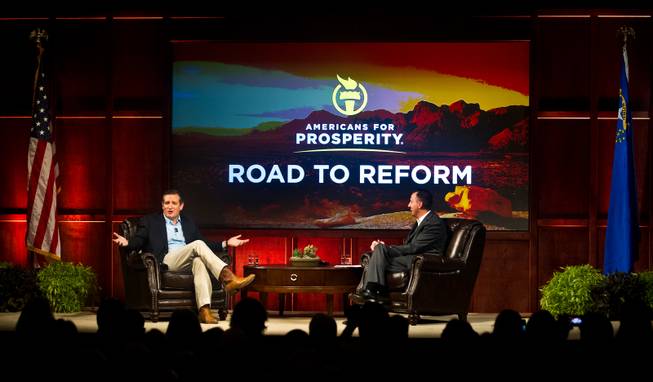

The native born create more jobs than immigrants do. Immigrants use our welfare system to a greater extent than the native born. 20% of legal immigrants lack even a high school degree. We don't have a shortage of skilled labor in this country. We have a surplus of labor. If we didn't, wages would be going up, not down. We have a shortage of jobs.
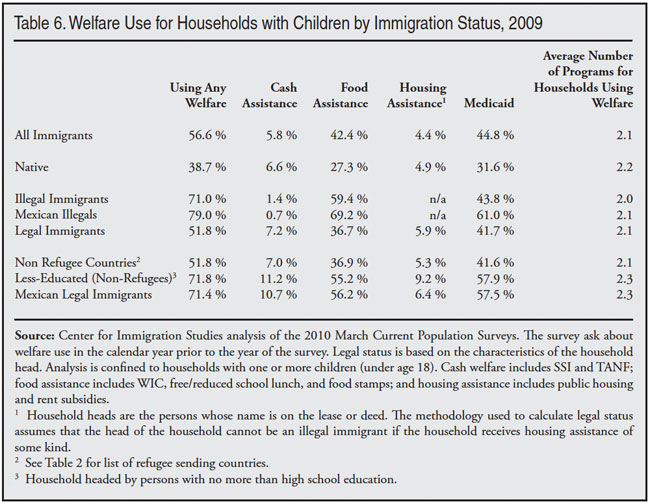
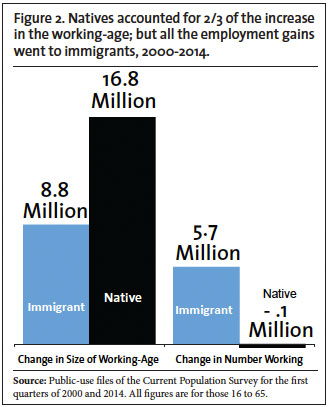
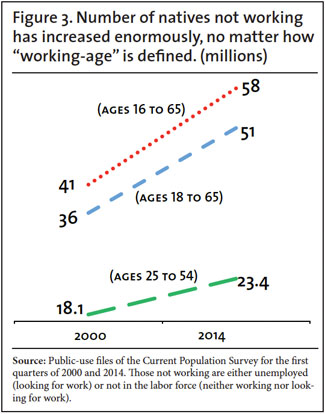
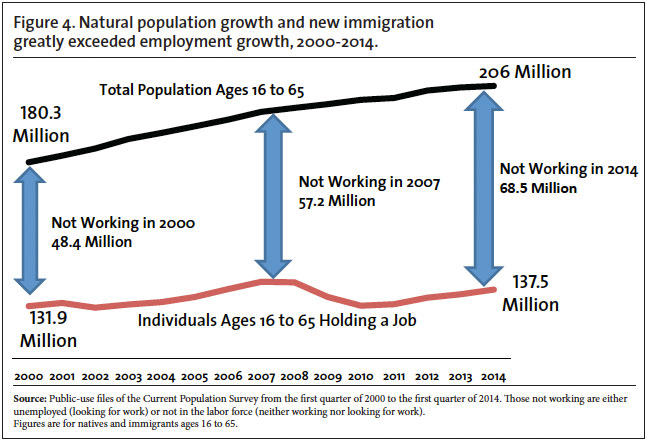
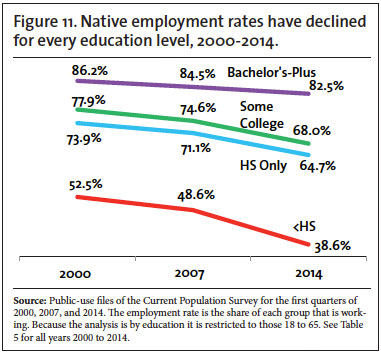
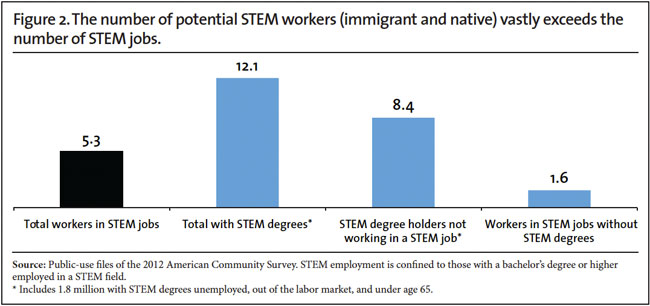
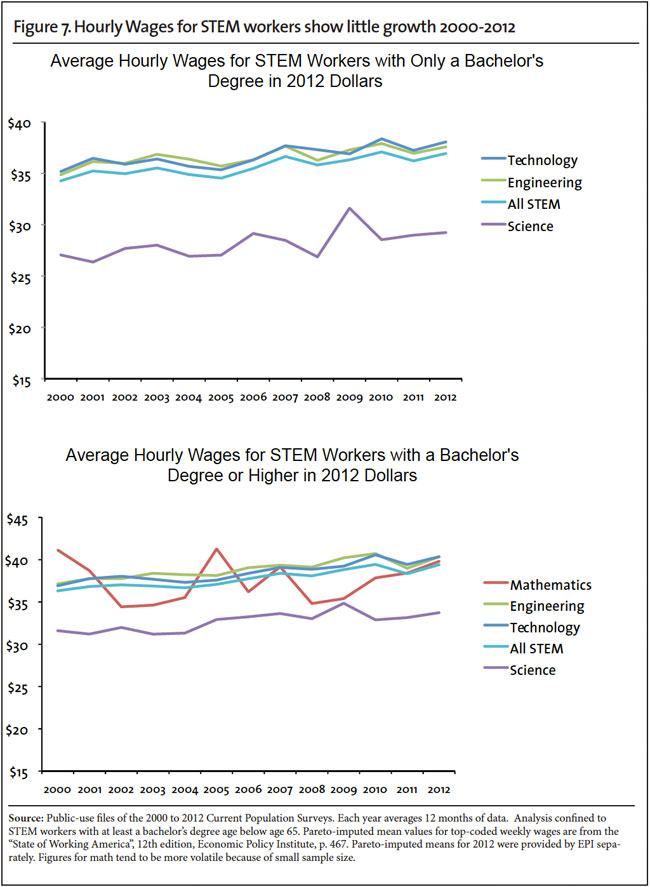
“I strongly support legal immigration. Legal immigration is a fundamental pillar of our nation's heritage, and I was pleased today to offer legislation that would have improved and expanded legal immigration by dramatically increasing the cap for high-tech temporary worker visas. This amendment would not only improve the current system, but would also encourage economic growth and create new jobs in America. There is currently a serious shortage of workers in the fields of science, technology, engineering, and math, yet every year we send thousands of high-tech graduate students back to their home countries to start businesses and create jobs. This makes no sense. I’m disappointed in the committee’s vote to reject expanding high-tech immigration. Although the Gang of Eight's bill makes a modest step towards improving high-tech immigration, it does not go nearly far enough. There is no reason to arbitrarily cap high-tech visas at 110,000 when these jobs are going unfilled. We need economic growth here and now.”
A huge, big lie to satisfy his corporate paymasters who want cheap labor. We have the lowest labor participation rates in 38 years and wages are declining. We don't need to expand the number of guest workers annually from the current figure of 640,000 a year. We need to reduce it. We also don't need 1.1 million legal permanent immigrants a year. We have just had the two highest decades of legal immigration in our history. In 1970 one out of 21 was foreign born; today. it is one out of 7 the highest in 105 years; and within a decade it will be the highest in our history. In 1970 we had 9.7 million foreign born and today it is 41.5 million. 87% of legal immigrants are minorities as defined by the USG. Immigrants and minorities vote more than two to one Dem.

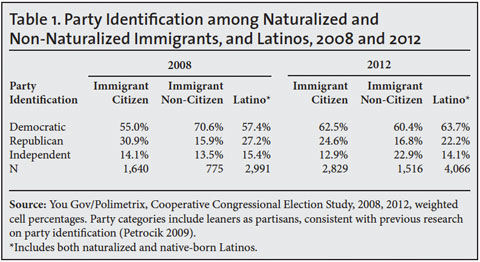
Here is how a real conservative, Jeff Sessions, talks about immigration:
When Americans went to the polls in 2012, the following was true: Work-force participation had sunk to its lowest level in 35 years, wages had fallen below 1999 levels, and 47 million Americans were on food stamps. Yet Mitt Romney, the challenger to the incumbent president, lost lower- and middle-income voters by an astonishing margin. Among voters earning $30,000 to $50,000, he trailed by 15 points, and among voters earning under $30,000 he trailed by 28 points.
And what did the GOP’s brilliant consultant class conclude from this resounding defeat? They declared that the GOP must embrace amnesty. The Republican National Committee dutifully issued a report calling for a “comprehensive immigration reform” that would inevitably increase the flow of low-skilled immigration, reducing the wages and living standards of the very voters whose trust the GOP had lost.
Over the past four decades, as factories were shuttered and blue-collar jobs were outsourced or automated, net immigration quadrupled. Yet the corporate-consultant class has pronounced that an insufficient level of immigration is the problem. A more colossal misreading of the political moment has rarely occurred.
Perhaps the most important political development now unfolding in the U.S. is the public’s growing loss of faith in our political and financial elites of both parties. To open the ears of disaffected voters, the GOP must break publicly from the elite immigration consensus of Wall Street and Davos. Republicans have a clear path to building a conservative majority if they free themselves from the corporate consultants and demonstrate to the American public that the GOP is the only party aligned with the core interests, concerns, and beliefs of everyday hardworking citizens.
“Most business leaders have long favored more open immigration. Different businesses want different kinds of people,” a prominent GOP fundraiser declared on TV. “A restaurant may want waiters and cooks; a hospital wants nurses and doctors; a university wants physicists; a business like Exelon needs more engineers.” Asked by the interviewer about hiring U.S. workers for open jobs, he replied that many of those now unemployed are “unable to compete for them.”
Is that the message of a winning party? It might win a majority of votes at a dinner party in a gated community in Bel Air, but it is an act of profound delusion to think that plan can form the basis of a nationwide Republican resurgence.
Democrats in Washington have already cast their lot. A recent report from the Center for Immigration Studies shows that all net employment gains from 2000 to 2013 — a period of record legal immigration — went to immigrant workers, and yet the immigration plan championed by the White House and congressional Democrats would triple the number of immigrants given permanent legal status over the next decade, and it would double the annual flow of guest workers to compete for jobs in every sector of the U.S. economy. The Democrats’ plan delivers for international corporations, open-borders groups, and even workers now living in other countries — all at the expense of American workers.
So Republicans have a choice. They can either join the Democrats as the second political party in Washington advocating uncontrolled immigration, or they can offer the public a principled alternative and represent the American workers Democrats have jettisoned. Republicans can either help the White House enact an immigration plan that will hollow out the American middle class, or they can finally expose the truth about the White House plan and detail the enormous harm it will inflict.
The last 40 years have been a period of uninterrupted large-scale immigration into the U.S., coinciding with increased joblessness, falling wages, failing schools, and a growing welfare state. Would not the sensible, conservative thing to do be to slow down for a bit, allow wages to rise and assimilation to occur, and help the millions struggling here today — immigrant and native-born alike — transition from dependency to self-sufficiency? Indeed, the heart of the GOP’s pro-worker, pro-middle-class agenda should be a bold reforming of our welfare system. The current welfare structure is unfair both to the taxpayers who fund it and to the struggling Americans it has failed to rescue from poverty.
What if, instead of applying for guest workers, companies applied to hire workers receiving job training at a local welfare office? Able-bodied adults, in turn, would be required to accept employment or lose benefits. In other words: instead of a guest-worker program, a welfare-to-work program.
The US labor market has been slow to recover from the deep recession of 2007–2009. As of September 2011, there were almost seven million fewer jobs than before the downturn. Policymakers have debated numerous ways to increase employment, from government spending to tax policy to training and education initiatives. But relatively little consideration has been given to immigration reform as a way to boost the economy, even though immigration policy affects innovation and job growth. Instead, the immigration debate has become painfully deadlocked, with widespread agreement that the current system is broken but little consensus on how it should be fixed. In these challenging times, more should be done to identify incremental changes to immigration policy that could be made immediately to boost employment for US workers and accelerate the country’s economic recovery.
To better understand the potential for immigration policy to help rejuvenate the US economy, policymakers need answers to basic questions such as whether the foreign born take jobs from the native born or instead create more jobs, on balance, and what types of immigrants generate the most jobs for native-born workers. Although numerous studies have explored how immigration affects natives’ wages, there is relatively little research on how immigration affects employment among US natives. This study seeks to fill this gap and answer the question of what specific changes to immigration policy could speed up American job growth.
There are two basic theories of how immigration affects natives’ labor market outcomes. One is that immigrants have the same skills as US natives and the two groups “compete” for jobs. In this view, immigration reduces natives’ employment. The other theory is that foreign-born workers “complement” US-born workers. That is, immigrants and natives have different skills, and immigration diversifies the workforce. Immigration results in more productive companies, stronger economic growth, and higher employment among US natives.
This study focuses on two groups most frequently identified by policymakers and employers as vital to America’s economy: foreign-born adults with advanced degrees and temporary work visa holders. (For simplicity, all foreign born are referred to here as immigrants, regardless of their visa type.) In trying to establish whether these groups help or hurt job prospects among US natives, the study uses hard numbers—annual data from the US Census Bureau and applications for temporary workers—to perform a state-level comparison that answers the question, “In states with more immigrants, are US natives more or less likely to have a job?” This study also looks at the fiscal effect of the foreign born by comparing the benefits they receive to the taxes they pay.
The analysis yields four main findings:
1. Immigrants with advanced degrees boost employment for US natives. This effect is most dramatic for immigrants with advanced degrees from US universities working in science, technology, engineering, and mathematics (STEM) fields. The data comparing employment among the fifty states and the District of Columbia show that from 2000 to 2007, an additional 100 foreign-born workers in STEM fields with advanced degrees from US universities is associated with an additional 262 jobs among US natives. While the effect is biggest for US-educated immigrants working in STEM, immigrants with advanced degrees in general raised employment among US natives during 2000–2007:
• An additional 100 immigrants with advanced degrees in STEM fields from either US or foreign universities is associated with an additional eighty-six jobs among US natives.
• An additional 100 immigrants with advanced degrees—regardless of field or where they obtained their degrees—is associated with an additional 44 jobs among US natives.
2. Temporary foreign workers—both skilled and less skilled—boost US employment. The data show that states with greater numbers of temporary workers in the H-1B program for skilled workers and H-2B program for less-skilled nonagricultural workers had higher employment among US natives. Specifically:
• Adding 100 H-1B workers results in an additional 183 jobs among US natives.
• Adding 100 H-2B workers results in an additional 464 jobs for US natives.
• For H-2A visas for less-skilled agricultural workers, the study found results that were positive, but data were available for such a short period that the results were not statistically significant.
3. The analysis yields no evidence that foreignborn workers, taken in the aggregate, hurt US employment. Even under the current immigration pattern—which is not designed to maximize job creation, has at least eight million unauthorized workers, and prioritizes family reunification—there is no statistically significant effect, either positive or negative, on the employment rate among US natives. The results thus do not indicate that immigration leads to fewer jobs for US natives.
4. Highly educated immigrants pay far more in taxes than they receive in benefits. In 2009, the average foreign-born adult with an advanced degree paid over $22,500 in federal, state, and Federal Insurance Contributions Act (FICA, or Social Security and Medicare) taxes, while their families received benefits one-tenth that size through government transfer programs like cash welfare, unemployment benefits, and Medicaid.
The results here point directly to several policy proposals that would boost US employment. These policies would require neither new taxes nor new spending cuts. Specifically, policymakers could create jobs by doing the following:
• Giving priority to workers who earn advanced degrees from US universities, especially those who work in STEM fields. The results show that the most dramatic gains in US employment come from immigrants who earned advanced degrees at US universities and are employed in STEM fields. Changing permanent and temporary immigration policies to favor holders of advanced degrees from US universities in STEM fields is an obvious step given the demand for highly skilled workers and the extensive investment the country already makes in such students. Without a clear path to stay in the United States, these foreign students will fuel innovation and economic growth in countries that compete with the American economy.
• Increasing the number of green cards (permanent visas) for highly educated workers. This study shows that foreign-born workers with advanced degrees create more jobs for US workers than immigrants overall. Yet only 7 percent of green cards are currently awarded to workers based on their employment. The United States can increase the number of immigrants with advanced degrees in the US workforce by increasing the number of green cards distributed through employment-based categories.
• Making available more temporary visas for both skilled and less-skilled workers. The findings here suggest that expanding the H-1B program for skilled temporary foreign workers would increase employment for US natives. Similarly, this study suggests that the H-2B program for seasonal, less-skilled workers in fields other than agriculture leads to significant employment gains for US natives. But both these programs are severely limited under current law. Only 85,000 H-1B visas and 66,000 H-2B visas are available each fiscal year, and the process for obtaining H- 2B visas is often prohibitively difficult and costly. This study found a positive but not statistically significant relationship between H-2A temporary agricultural visas and employment among US natives. Further study is warranted to explore whether H-2A visas should be increased as well.
America is currently mired in a period of the slowest economic growth seen in several generations, with persistently high unemployment, anemic job growth, and little bipartisan agreement on how to address these pressing problems. Action is required if America is to get back to work. Immigration policy can, and should, be a significant component of America’s economic recovery. Targeted changes to immigration policy geared toward admitting more highly educated immigrants and more temporary workers for specific sectors of the economy would help generate the growth, economic opportunity, and new jobs that America needs.
Madeline Zavodny is a professor of economics at Agnes Scott College
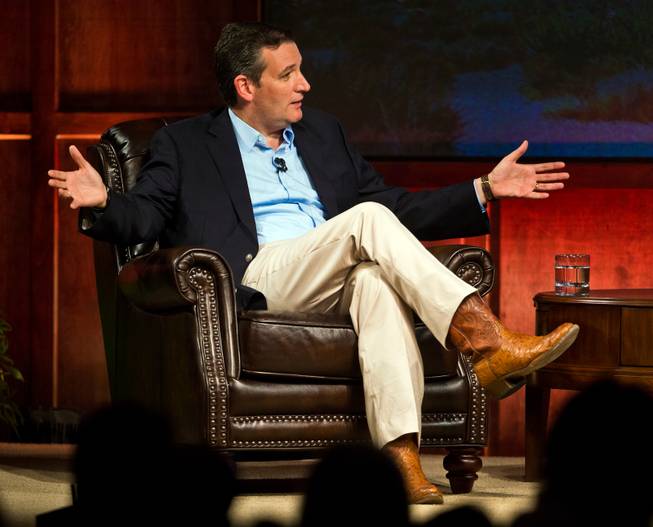


Disclaimer: Opinions posted on Free Republic are those of the individual posters and do not necessarily represent the opinion of Free Republic or its management. All materials posted herein are protected by copyright law and the exemption for fair use of copyrighted works.